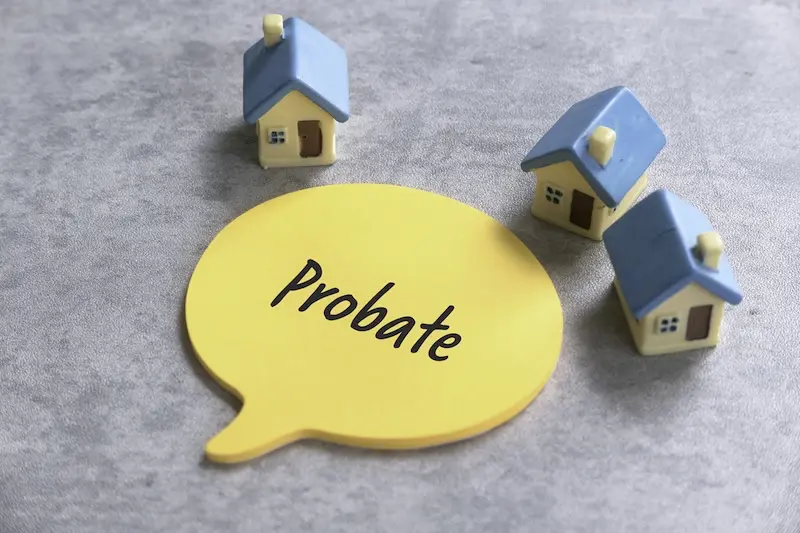Selling a probate property can be a complex and emotional journey. After all, it’s not just about selling a house, which is a stressful undertaking on its own. For some, it can mean putting a much-loved family home on the property market, whilst also navigating the probate process – all while grieving a loved one.
When selling a probate property, there’s a whole range of legal and practical aspects to be considered. In Ireland, the probate process must be completed before a sale can be finalised, adding another layer of complexity to an already sensitive situation. Whether you are an executor managing the deceased’s estate or a beneficiary of a loved one’s estate, understanding the steps involved can make the process smoother and more manageable.
This guide provides a clear overview of what’s involved in selling a probate property in Ireland, helping you move forward with confidence.
What is a probate property?
Before we delve into the practicalities of selling a probate property, let’s first look at the basics. What is meant by a probate property? On its own, the term probate refers to the process by which a deceased person’s estate is administered. This process entails organising their money, assets and possessions, and distributing all of these to the relevant beneficiaries.
While the probate process covers far more than just property, the term probate property specifically refers to a property that was owned by someone who has passed away. The property becomes part of the deceased’s estate and must be either transferred to beneficiaries or sold to settle debts and distribute proceeds.
Key steps in selling a probate property
Due to multiple timelines at play, selling a probate property requires careful planning. Of course, adherence to the legal requirements at every stage is an absolute necessity. The process involves several stages:
1. Obtaining a Grant of Representation
Before a probate property can be sold, the executor or administrator must secure a Grant of Representation. This legal document provides the authority to manage the deceased’s assets, including the property. There are three types of Grants, depending on the circumstances:
- Grant of Probate: If there is a valid will and an executor is named.
- Grant of Administration: If there is no will and an administrator has been appointed.
- Grant of Administration with Will Annexed: If there is a will but the executor is unable or unwilling to act.
Without this Grant, the sale cannot be legally completed. However, it’s worth noting that in cases where a property has been owned jointly by two people, such as two spouses for example, it automatically goes to the surviving party. This is permitted under the Rule of Survivorship in Ireland.
2. Valuing the property
As part of the probate process, the property must be professionally valued. The valuation is typically backdated to the date of the deceased’s passing. This value is essential for both the probate application and determining the sale price. It should be noted that an inaccurate value for probate purposes could potentially result in unnecessary taxes being charged.
3. Preparing the property for sale
While waiting for the Grant of Representation, the property can be prepared for sale. This may involve:
- Cleaning and clearing the property.
- Addressing any necessary repairs or maintenance.
- Ensuring the property is secure and appropriately insured.
While there is an emotional aspect to clearing out a recently deceased loved one’s home, taking the time to get the property looking spick and span can make a huge difference when it comes to the selling price. Essentially, you want prospective buyers to see the property in the very best light, and the potential to begin a new chapter for the home.
4. Listing the property
Once the property is market-ready, it can be listed for sale. Probate properties often appeal to prospective buyers as there is no onward chain, which can streamline the purchasing process. Conduct some research and find a reputable estate agent who has a good knowledge of the local property market.
Can you sell before probate is complete?
As anyone who has purchased a home will know, the conveyancing process can be equally as lengthy as the probate process. It is possible to list a probate property for sale and even accept offers while the Grant of Representation is pending. Moreover, there is an advantage in agreeing to a sale before the grant is issued – the sales price achieved will provide the most accurate value for this probate process. However, it simply must be stressed that the sale cannot be finalised until the Grant is issued.
In the interim, the conveyancing process can proceed, allowing for property searches and other preparations. On a positive note, the government has recently set up a new body called The Housing for All Conveyancing and Probate Implementation Group. This group aims to prevent homes from lying empty due to being caught up in lengthy conveyancing and probate processes.
Challenges in selling a probate property
Selling a probate property is not without its challenges, particularly due to the fact it involves two complex processes – probate and conveyancing. Even the simplest of either of these processes can encounter an unexpected obstacle along the way.
- Delays in probate: Gathering the required documents and information can take time, particularly for complex estates.
- Disagreements among beneficiaries: Differing opinions on whether to sell or keep the property can cause tension, particularly when it comes to the family home.
- Outstanding debts: Proceeds from the sale may be required to settle debts, which can impact the final distribution.
Navigating these challenges requires clear communication and professional guidance.
Why professional guidance matters when selling a probate property
Due to the complex nature of selling a probate property, it’s essential to have the right expertise on your side. Attempting to sell a probate property without the guidance of an experienced probate solicitor leaves you open to making errors that can be both costly in time and money. It’s also essential to ensure that you are adhering to the correct legal procedures required – this is where the assistance of your probate solicitor is worth every cent.
A probate solicitor can help with:
- Completing the probate application accurately and efficiently.
- Addressing any disputes among beneficiaries.
- Ensuring the sale complies with legal requirements.
Similarly, a conveyancing solicitor can manage the property sale, from drafting contracts to liaising with buyers and estate agents. Choosing a solicitor who has both expertise in conveyancing and probate is certainly advantageous. Alternatively, selecting a legal firm which has a team dedicated to both probate and conveyancing will ensure a collaborative approach, keeping the two processes running smoothly.
Frequently asked questions about selling a probate property
1. What happens if the property is jointly owned?
If the property was owned as joint tenants, it typically passes to the surviving co-owner through the Rule of Survivorship, bypassing probate. If the property was held as tenants in common or solely by the deceased, probate is necessary.
2. Can the property be transferred instead of sold?
Yes, the property can be transferred to the beneficiaries named in the will or under the Succession Act if there is no will. This decision is usually made by the executor in consultation with the beneficiaries.
3. How long does the process take?
The timeline for selling a probate property depends on the complexity of the estate and it also varies from county to county in Ireland. On average, it can take several months to a year.
Summit Law is here to help with your probate needs
At Summit Law, we understand that selling a probate property can be an overwhelming experience. We have dedicated teams of both probate and conveyancing solicitors who are on hand to provide a seamless, compassionate service, guiding you through each step with clarity and care.
Whether you need help obtaining a Grant of Representation or managing the sale, we are here to ensure the process is as straightforward as possible, safeguarding your interests and those of the beneficiaries.
Contact us today to arrange a confidential consultation with our experienced probate and conveyancing solicitors.



